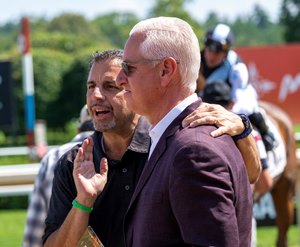NY Court to Weigh Due Process Rights in Pletcher Case


The New York Supreme Court of Schenectady County gave trainer Todd Pletcher and owner Mike Repole a victory in a March 28 ruling related to the ongoing appeal of Forte 's disqualification in the 2022 Hopeful Stakes (G1) due to a medication positive.
Judge Michael Cuevas denied a request by the New York State Gaming Commission to transfer the case to the Appellate Division because his court needed to first investigate issues related to due process and the interpretation of state rules involving the disqualification.
Cuevas also granted a temporary injunction that blocked the enforcement of a NYSGC order that suspended Pletcher for 10 days and fined him $1,000 after a post-race test found the non-steroidal anti-inflammatory drug meloxicam in Forte's blood and urine samples.
"This was a huge victory for us today," said attorney Andrew Mollica. "It is early, but Mr. Pletcher, Mr. Repole, and myself are over the moon that the Supreme Court wants to adjudicate the issues we raised at this level. We look forward to litigating these serious legal and procedural issues related to due process."
The judge scheduled a conference with the attorneys May 10 to determine whether there are any issues of fact requiring trial and whether any additional briefing is necessary.
The Supreme Court will focus on two specific issues.
One is whether the NYSGC appropriately applied a rule related to other NSAIDs to the meloxicam positive. Mollica said meloxicam is not specifically prohibited in state regulations. He has argued that the commission misapplied a 48-hour rule regarding NSAIDs by imposing an unstated "zero-tolerance" rule. Drugs not specifically delineated by time restriction are considered to be prohibited within seven days of a race and any violation requires proof that the drug was given within the seven-day window, according to Mollica. Dr. George Maylin has previously testified that the level in Forte's sample was so low it could not have been given within seven days.
"A reading of the transcript of the hearing clearly demonstrates that the interpretation of the Commission's rules was at issue. On the question of vagueness and lack of a zero-tolerance rule, it appears that even the hearing officer was confused," wrote Cuevas in his ruling. He said the hearing officer, Clark Petschek, referenced meloxicam as a drug that could not be administered within a week of race day, not a "prohibited drug" or a "zero-tolerance drug."
The second issue to be reviewed by the Supreme Court is related to whether Pletcher's right to due process was violated during his hearing. The NYSGC does allow intervenors to participate in hearings and in this case it was attorney Clark Brewster representing Bill and Corinne Heiligbrodt, who co-owned the Hopeful second-place finisher Gulfport .
Petschek's hearing was actually a joint hearing that addressed both Pletcher's appeal of the disciplinary ruling and Repole's appeal of Forte's disqualification. Under the NYSGC's "ad hoc" rules for hearings, according to Cuevas' ruling, Brewster's role should have been limited to Repole's dispute of Forte's disqualification.
"Additionally, the commission's rules allow a party to be represented by an attorney, by clear implication, an attorney admitted to practice in the State of New York," the judge's ruling states. Brewster is not licensed to practice in New York, though commission counsel did submit a "Declaration of Attorney not Admitted to Practice in New York State" affirmation to satisfy the rules required to allow an out-of-state attorney to "temporarily practice" alongside a New York-licensed sponsor attorney. Prior to the hearing, however, Pletcher's attorney Karen Murphy presented more detailed arguments on why Brewster's participation in the quasi-judicial proceeding was not permissible.
Brewster participated in the hearing without limitation and was allowed to cross-examine witnesses and present evidence and arguments.
"The law clearly anticipates an application and a right of the parties to the proceeding to be heard on the intervention request. The record here suggests that the Commission made an ex parte determination to grant intervenor status in the disqualification hearing ... However, it never specifically granted permissive intervention in Pletcher's discipline hearing," Cuevas wrote in his ruling. "Even after Pletcher's counsel objected, the e-mail exchange does not appear to adequately address whether the intervenor had any right to intervene in Pletcher's disciplinary proceeding."
If the Supreme Court finds Pletcher's due process rights were violated, it will go a long way toward the goal of Pletcher and Repole's legal team to have the commission's order overturned.
Regarding the temporary injunction staying the disciplinary action, Cuevas said Pletcher's case met a three-prong test: that Pletcher had a reasonable likeliness to succeed in an appeal on its merits; that irreparable harm that cannot be "simply repaired by money" can occur, such as loss of customer goodwill; and, the "balance of equities" favors Pletcher, in that the action could affect his employees and have "a substantial impact on other parties."
